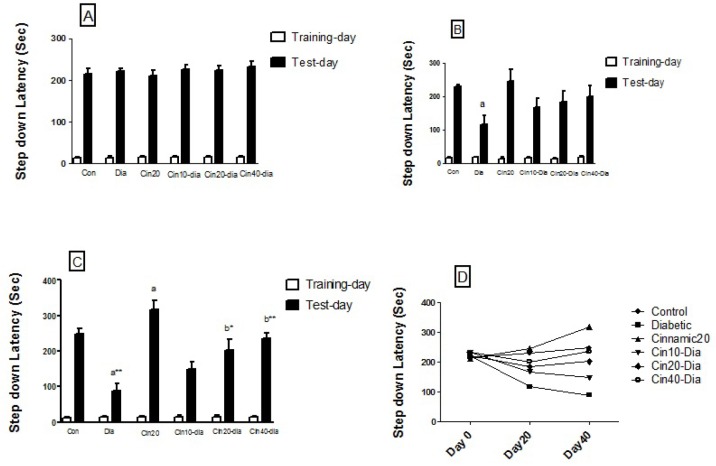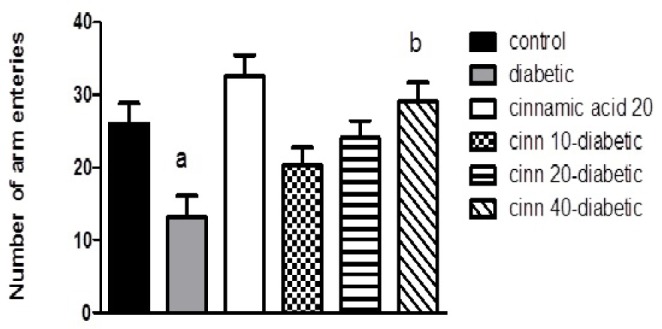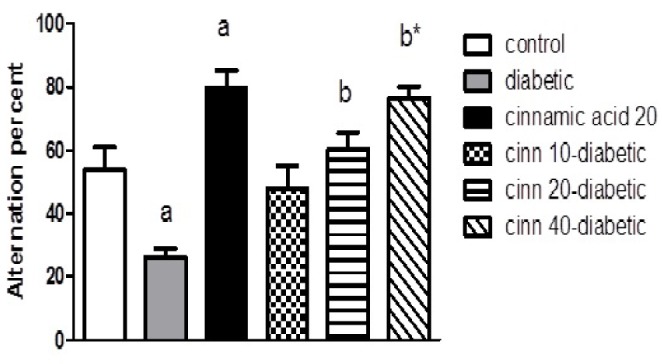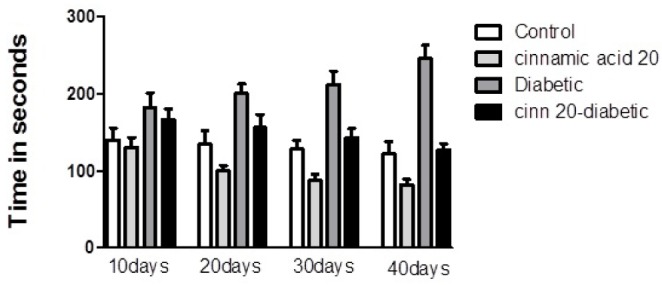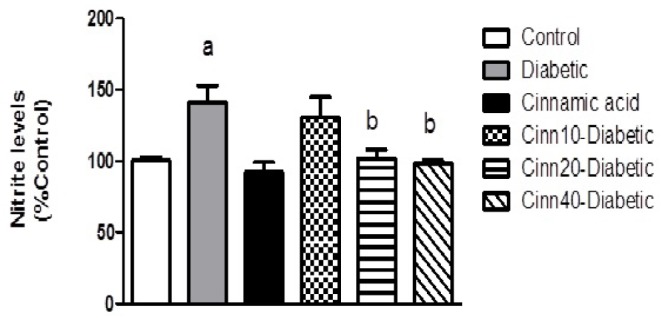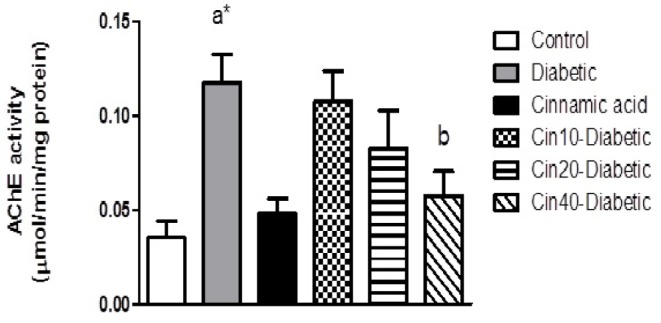Korean J Physiol Pharmacol.
2018 May;22(3):257-267. 10.4196/kjpp.2018.22.3.257.
Effects of cinnamic acid on memory deficits and brain oxidative stress in streptozotocin-induced diabetic mice
- Affiliations
-
- 1Department of Pharmacology, School of Medicine, Ahvaz Jundishapur University of Medical Sciences, Ahvaz 61357-15794, Iran.
- 2Department of Pharmacology, School of Medicine, Student Research Committee of Ahvaz Jundishapur University of Medical Sciences, Ahvaz 61357-15794, Iran. alboghobeish.s@ajums.ac.ir
- 3Health Research Institute, Diabetes Research Center, Department of Physiology, Ahvaz Jundishapur University of Medical Sciences, Ahvaz 61357-15794, Iran.
- KMID: 2410090
- DOI: http://doi.org/10.4196/kjpp.2018.22.3.257
Abstract
- The present study aimed to evaluate the cinnamic acid effect on memory impairment, oxidative stress, and cholinergic dysfunction in streptozotocin (STZ)-induced diabetic model in mice. In this experimental study, 48 male Naval Medical Research Institute (NMRI) mice (30-35 g) were chosen and were randomly divided into six groups: control, cinnamic acid (20 mg/kg day, i.p. ), diabetic, and cinnamic acid-treated diabetic (10, 20 and 40 mg/kg day, i.p. ). Memory was impaired by administering an intraperitoneal STZ injection of 50 mg/kg. Cinnamic acid was injected for 40 days starting from the 21st day after confirming STZ-induced dementia to observe its therapeutic effect. Memory function was assessed using cross-arm maze, morris water maze and passive avoidance test. After the administration, biochemical parameters of oxidative stress and cholinergic function were estimated in the brain. Present data indicated that inducing STZ caused significant memory impairment, whereas administration of cinnamic acid caused significant and dose-dependent memory improvement. Assessment of brain homogenates indicated cholinergic dysfunction, increase in lipid peroxidation and reactive oxygen species (ROS) levels, and decrease in glutathione (GSH), superoxide dismutase (SOD), and catalase (CAT) activities in the diabetic group compared to the control animals, whereas cinnamic acid administration ameliorated these indices in the diabetic mice. The present study demonstrated that cinnamic acid improves memory by reducing the oxidative stress and cholinergic dysfunction in the brain of diabetic mice.
Keyword
MeSH Terms
Figure
Reference
-
1. Kumar R, Jaggi AS, Singh N. Effects of erythropoietin on memory deficits and brain oxidative stress in the mouse models of dementia. Korean J Physiol Pharmacol. 2010; 14:345–352. PMID: 21165335.
Article3. Liu X, Liu M, Mo Y, Peng H, Gong J, Li Z, Chen J, Xie J. Naringin ameliorates cognitive deficits in streptozotocin-induced diabetic rats. Iran J Basic Med Sci. 2016; 19:417–422. PMID: 27279986.4. Moghadamnia AA, Hakiminia S, Baradaran M, Kazemi S, Ashrafpour M. Vitamin D improves learning and memory impairment in streptozotocin-induced diabetic mice. Arch Iran Med. 2015; 18:362–366. PMID: 26058931.5. Hasanein P, Shahidi S. Effects of combined treatment with vitamins C and E on passive avoidance learning and memory in diabetic rats. Neurobiol Learn Mem. 2010; 93:472–478. PMID: 20085822.
Article6. Modi KK, Roy A, Brahmachari S, Rangasamy SB, Pahan K. Cinnamon and its metabolite sodium benzoate attenuate the activation of p21rac and protect memory and learning in an animal model of alzheimer's disease. PLoS One. 2015; 10:e0130398. PMID: 26102198.
Article7. Good M. Spatial memory and hippocampal function: where are we now. Psicológica. 2002; 23:109–138.8. Wattanathorn J, Jittiwat J, Tongun T, Muchimapura S, Ingkaninan K. Zingiber officinale mitigates brain damage and improves memory impairment in focal cerebral ischemic rat. Evid Based Complement Alternat Med. 2011; 2011:429505. PMID: 21197427.9. Koo BS, Lee WC, Chang YC, Kim CH. Protective effects of alpinae oxyphyllae fructus (Alpinia oxyphylla MIQ) water-extracts on neurons from ischemic damage and neuronal cell toxicity. Phytother Res. 2004; 18:142–148. PMID: 15022167.10. Suk K, Kim SY, Leem K, Kim YO, Park SY, Hur J, Baek J, Lee KJ, Zheng HZ, Kim H. Neuroprotection by methanol extract of Uncaria rhynchophylla against global cerebral ischemia in rats. Life Sci. 2002; 70:2467–2480. PMID: 12173411.
Article11. Calapai G, Crupi A, Firenzuoli F, Marciano MC, Squadrito F, Inferrera G, Parisi A, Rizzo A, Crisafulli C, Fiore A, Caputi AP. Neuroprotective effects of Ginkgo biloba extract in brain ischemia are mediated by inhibition of nitric oxide synthesis. Life Sci. 2000; 67:2673–2683. PMID: 11105983.
Article12. Hafizur RM, Hameed A, Shukrana M, Raza SA, Chishti S, Kabir N, Siddiqui RA. Cinnamic acid exerts anti-diabetic activity by improving glucose tolerance in vivo and by stimulating insulin secretion in vitro. Phytomedicine. 2015; 22:297–300. PMID: 25765836.
Article13. Anderson RA, Broadhurst CL, Polansky MM, Schmidt WF, Khan A, Flanagan VP, Schoene NW, Graves DJ. Isolation and characterization of polyphenol type-A polymers from cinnamon with insulinlike biological activity. J Agric Food Chem. 2004; 52:65–70. PMID: 14709014.
Article14. Jiao L, Zhang X, Huang L, Gong H, Cheng B, Sun Y, Li Y, Liu Q, Zheng L, Huang K. Proanthocyanidins are the major anti-diabetic components of cinnamon water extract. Food Chem Toxicol. 2013; 56:398–405. PMID: 23499750.
Article15. Chen Y, Ma Y, Ma W. Pharmacokinetics and bioavailability of cinnamic acid after oral administration of Ramulus Cinnamomi in rats. Eur J Drug Metab Pharmacokinet. 2009; 34:51–56. PMID: 19462929.
Article16. Huang DW, Shen SC. Caffeic acid and cinnamic acid ameliorate glucose metabolism via modulating glycogenesis and gluconeogenesis in insulin-resistant mouse hepatocytes. J Funct Food. 2012; 4:358–366.
Article17. Lee EJ, Kim SR, Kim J, Kim YC. Hepatoprotective phenylpropanoids from Scrophularia buergeriana roots against CCl(4)-induced toxicity: action mechanism and structure-activity relationship. Planta Med. 2002; 68:407–411. PMID: 12058315.
Article18. Natella F, Nardini M, Di Felice M, Scaccini C. Benzoic and cinnamic acid derivatives as antioxidants: structure-activity relation. J Agric Food Chem. 1999; 47:1453–1459. PMID: 10563998.
Article19. Adisakwattana S, Sompong W, Meeprom A, Ngamukote S, Yibchok-Anun S. Cinnamic acid and its derivatives inhibit fructose-mediated protein glycation. Int J Mol Sci. 2012; 13:1778–1789. PMID: 22408423.
Article20. Yuan HD, Huang B, Chung SH. Protective effect of cinnamaldehyde on streptozotocin-induced damage in rat pancreatic β-cells. Food Sci Biotechnol. 2011; 20:1271–1276.
Article21. Sharma P. Cinnamic acid derivatives: a new chapter of various pharmacological activities. J Chem Pharm Res. 2011; 3:403–423.22. Babaei-Balderlou F, Zare S. Melatonin improves spatial navigation memory in male diabetic rats. Vet Res Forum. 2012; 3:187–192. PMID: 25610567.23. Nootarki ZS, Kesmati M, Borujeni MP. Effect of magnesium oxide nanoparticles on atropine-induced memory impairment in adult male mice. Avicenna J Neuro Psycho Physiol. 2015; 2:e36924.
Article24. Jafari-Sabet M. Involvement of dorsal hippocampal muscarinic cholinergic receptors on muscimol state-dependent memory of passive avoidance in mice. Life Sci. 2011; 88:1136–1141. PMID: 21557951.
Article25. Guan H, Li S, Guo Y, Liu X, Yang Y, Guo J, Li S, Zhang C, Shang L, Piao F. Subchronic exposure to arsenic represses the TH/TRβ1-CaMK IV signaling pathway in mouse cerebellum. Int J Mol Sci. 2016; 17:E157. PMID: 26821021.
Article26. Ragozzino ME, Pal SN, Unick K, Stefani MR, Gold PE. Modulation of hippocampal acetylcholine release and spontaneous alternation scores by intrahippocampal glucose injections. J Neurosci. 1998; 18:1595–1601. PMID: 9454864.
Article27. Morris R. Developments of a water-maze procedure for studying spatial learning in the rat. J Neurosci Methods. 1984; 11:47–60. PMID: 6471907.
Article28. Morris RGM. Spatial location does not require the presence of local cues. Learn Motiv. 1981; 12:239–260.29. Chaudhuri AN, Basu S, Chattopadhyay S, Das Gupta S. Effect of high arsenic content in drinking water on rat brain. Indian J Biochem Biophys. 1999; 36:51–54. PMID: 10549161.30. Jain A, Yadav A, Bozhkov AI, Padalko VI, Flora SJ. Therapeutic efficacy of silymarin and naringenin in reducing arsenic-induced hepatic damage in young rats. Ecotoxicol Environ Saf. 2011; 74:607–614. PMID: 20719385.
Article31. Sinha M, Manna P, Sil PC. Arjunolic acid attenuates arsenicinduced nephrotoxicity. Pathophysiology. 2008; 15:147–156. PMID: 18434106.
Article32. Sokolovic D, Djindjic B, Nikolic J, Bjelakovic G, Pavlovic D, Kocic G, Krstic D, Cvetkovic T, Pavlovic V. Melatonin reduces oxidative stress induced by chronic exposure of microwave radiation from mobile phones in rat brain. J Radiat Res. 2008; 49:579–586. PMID: 18827438.
Article33. Kakkar P, Das B, Viswanathan PN. A modified spectrophotometric assay of superoxide dismutase. Indian J Biochem Biophys. 1984; 21:130–132. PMID: 6490072.34. Lowry OH, Rosebrough NJ, Farr AL, Randall RJ. Protein measurement with the Folin phenol reagent. J Biol Chem. 1951; 193:265–275. PMID: 14907713.
Article35. Green LC, Wagner DA, Glogowski J, Skipper PL, Wishnok JS, Tannenbaum SR. Analysis of nitrate, nitrite, and [15N]nitrate in biological fluids. Anal Biochem. 1982; 126:131–138. PMID: 7181105.
Article36. Ellman GL, Courtney KD, Andres V Jr, Featherstone RM. A new and rapid colorimetric determination of acetylcholinesterase activity. Biochem Pharmacol. 1961; 7:88–95. PMID: 13726518.
Article37. Sánchez-Chávez G, Salceda R. Effect of streptozotocin-induced diabetes on activities of cholinesterases in the rat retina. IUBMB Life. 2000; 49:283–287. PMID: 10995030.38. Feldman EL, Stevens MJ, Greene DA. Pathogenesis of diabetic neuropathy. Clin Neurosci. 1997; 4:365–370. PMID: 9358981.39. Baynes JW, Thorpe SR. Role of oxidative stress in diabetic complications: a new perspective on an old paradigm. Diabetes. 1999; 48:1–9. PMID: 9892215.
Article40. Babaei-Balderlou F, Zare S, Heidari R, Farrokhi F. Effects of melatonin and vitamin E on peripheral neuropathic pain in streptozotocin-induced diabetic rats. Iran J Basic Med Sci. 2010; 13:1–8.41. Tuzcu M, Baydas G. Effect of melatonin and vitamin E on diabetesinduced learning and memory impairment in rats. Eur J Pharmacol. 2006; 537:106–110. PMID: 16626697.
Article42. Nedzvetsky VS, Nerush PA, Kirichenko SV. Effect of melatonin on cognitive ability of rats and expression of NCAM in the brain structures in streptozotocin-induced diabetes. Neurophysiol. 2003; 35:422–427.
Article43. Parihar MS, Chaudhary M, Shetty R, Hemnani T. Susceptibility of hippocampus and cerebral cortex to oxidative damage in streptozotocin treated mice: prevention by extracts of Withania somnifera and Aloe vera. J Clin Neurosci. 2004; 11:397–402. PMID: 15080956.
Article44. Nitsch R, Hoyer S. Local action of the diabetogenic drug, streptozotocin, on glucose and energy metabolism in rat brain cortex. Neurosci Lett. 1991; 128:199–202. PMID: 1834965.
Article45. Lannert H, Hoyer S. Intracerebroventricular administration of streptozotocin causes long-term diminutions in learning and memory abilities and in cerebral energy metabolism in adult rats. Behav Neurosci. 1998; 112:1199–1208. PMID: 9829797.
Article46. Sharma M, Gupta YK. Intracerebroventricular injection of streptozotocin in rats produces both oxidative stress in the brain and cognitive impairment. Life Sci. 2001; 68:1021–1029. PMID: 11212865.
Article47. Agrawal R, Tyagi E, Shukla R, Nath C. A study of brain insulin receptors, AChE activity and oxidative stress in rat model of ICV STZ induced dementia. Neuropharmacology. 2009; 56:779–787. PMID: 19705549.
Article48. Chen S, An FM, Yin L, Liu AR, Yin DK, Yao WB, Gao XD. Glucagon-like peptide-1 protects hippocampal neurons against advanced glycation end product-induced tau hyperphosphorylation. Neuroscience. 2014; 256:137–146. PMID: 24183963.
Article49. Gao C, Liu Y, Jiang Y, Ding J, Li L. Geniposide ameliorates learning memory deficits, reduces tau phosphorylation and decreases apoptosis via GSK3β pathway in streptozotocin-induced alzheimer rat model. Brain Pathol. 2014; 24:261–269. PMID: 24329968.
Article50. Kamat PK, Rai S, Swarnkar S, Shukla R, Nath C. Mechanism of synapse redox stress in Okadaic acid (ICV) induced memory impairment: role of NMDA receptor. Neurochem Int. 2014; 76:32–41. PMID: 24984170.
Article51. Wolff SP, Dean RT. Glucose autoxidation and protein modification. The potential role of ‘autoxidative glycosylation’ in diabetes. Biochem J. 1987; 245:243–250. PMID: 3117042.
Article52. Pathan AR, Viswanad B, Sonkusare SK, Ramarao P. Chronic administration of pioglitazone attenuates intracerebroventricular streptozotocin induced-memory impairment in rats. Life Sci. 2006; 79:2209–2216. PMID: 16904700.
Article53. Plaschke K, Hoyer S. Action of the diabetogenic drug streptozotocin on glycolytic and glycogenolytic metabolism in adult rat brain cortex and hippocampus. Int J Dev Neurosci. 1993; 11:477–483. PMID: 8237464.
Article54. Cosentino F, Hishikawa K, Katusic ZS, Lüscher TF. High glucose increases nitric oxide synthase expression and superoxide anion generation in human aortic endothelial cells. Circulation. 1997; 96:25–28. PMID: 9236411.
Article55. Spitaler MM, Graier WF. Vascular targets of redox signalling in diabetes mellitus. Diabetologia. 2002; 45:476–494. PMID: 12032623.
Article56. Ceriello A, Quagliaro L, D'Amico M, Di Filippo C, Marfella R, Nappo F, Berrino L, Rossi F, Giugliano D. Acute hyperglycemia induces nitrotyrosine formation and apoptosis in perfused heart from rat. Diabetes. 2002; 51:1076–1082. PMID: 11916928.
Article57. Nash DT, Fillit H. Cardiovascular disease risk factors and cognitive impairment. Am J Cardiol. 2006; 97:1262–1265. PMID: 16616038.
Article58. Fisher ND, Sorond FA, Hollenberg NK. Cocoa flavanols and brain perfusion. J Cardiovasc Pharmacol. 2006; 47(Suppl 2):S210–S214. PMID: 16794460.
Article59. Ganguli M, Chandra V, Kamboh MI, Johnston JM, Dodge HH, Thelma BK, Juyal RC, Pandav R, Belle SH, DeKosky ST. Apolipoprotein E polymorphism and Alzheimer disease: the Indo-US Cross-National Dementia Study. Arch Neurol. 2000; 57:824–830. PMID: 10867779.60. Anwar MM, Meki AR. Oxidative stress in streptozotocin-induced diabetic rats: effects of garlic oil and melatonin. Comp Biochem Physiol A Mol Integr Physiol. 2003; 135:539–547. PMID: 12890544.
Article61. Baydas G, Sonkaya E, Tuzcu M, Yasar A, Donder E. Novel role for gabapentin in neuroprotection of central nervous system in streptozotocine-induced diabetic rats. Acta Pharmacol Sin. 2005; 26:417–422. PMID: 15780189.62. Alvarez EO, Beauquis J, Revsin Y, Banzan AM, Roig P, De Nicola AF, Saravia F. Cognitive dysfunction and hippocampal changes in experimental type 1 diabetes. Behav Brain Res. 2009; 198:224–230. PMID: 19041902.
Article63. Moazedi AA, Parsa M, Rashidi SH, Chinipardaz R. The effect of diatery butter on spatial learning using T-maze in mal rats. Physiol Pharmacol. 2002; 5:179–188.64. Lupien SB, Bluhm EJ, Ishii DN. Systemic insulin-like growth factor-I administration prevents cognitive impairment in diabetic rats, and brain IGF regulates learning/memory in normal adult rats. J Neurosci Res. 2003; 74:512–523. PMID: 14598295.
Article65. Magariños AM, McEwen BS. Experimental diabetes in rats causes hippocampal dendritic and synaptic reorganization and increased glucocorticoid reactivity to stress. Proc Natl Acad Sci U S A. 2000; 97:11056–11061. PMID: 11005876.66. Flood JF, Mooradian AD, Morley JE. Characteristics of learning and memory in streptozocin-induced diabetic mice. Diabetes. 1990; 39:1391–1398. PMID: 2146179.
Article67. Grzeda E, Wiśniewska RJ, Wiśniewski K. Effect of an NMDA receptor agonist on T-maze and passive avoidance test in 12-week streptozotocin-induced diabetic rats. Pharmacol Rep. 2007; 59:656–663. PMID: 18195454.68. Zare K, Tabatabaei SR, Shahriari A, Jafari RA. The effect of butter oil on avoidance memory in normal and diabetic rats. Iran J Basic Med Sci. 2012; 15:983–989. PMID: 23492733.69. Bogdashev NN, Tukhovskaya NA, Pogrebnyak AV. Physicochemical characterization of cinnamic acid derivatives. Part 1. Relationship between antioxidant activity and physicochemical properties. Pharm Chem J. 1998; 32:86–88.
Article70. Chen JH, Ho CT. Antioxidant activities of caffeic acid and its related hydroxycinnamic acid compounds. J Agric Food Chem. 1997; 45:2374–2378.
Article71. Welsh B, Wecker L. Effects of streptozotocin-induced diabetes on acetylcholine metabolism in rat brain. Neurochemical Research. 1991; 16:453–460. PMID: 1833657.
Article72. Weinstock M, Kirschbaum-Slager N, Lazarovici P, Bejar C, Youdim MB, Shoham S. Neuroprotective effects of novel cholinesterase inhibitors derived from rasagiline as potential anti-Alzheimer drugs. Ann N Y Acad Sci. 2001; 939:148–161. PMID: 11462767.
Article73. Racchi M, Mazzucchelli M, Porrello E, Lanni C, Govoni S. Acetylcholinesterase inhibitors: novel activities of old molecules. Pharmacol Res. 2004; 50:441–451. PMID: 15304241.
Article74. Lester-Coll N, Rivera EJ, Soscia SJ, Doiron K, Wands JR, de la Monte SM. Intracerebral streptozotocin model of type 3 diabetes: relevance to sporadic Alzheimer's disease. J Alzheimers Dis. 2006; 9:13–33. PMID: 16627931.
Article75. Saxena G, Singh SP, Pal R, Singh S, Pratap R, Nath C. Gugulipid, an extract of Commiphora whighitii with lipid-lowering properties, has protective effects against streptozotocin-induced memory deficits in mice. Pharmacol Biochem Behav. 2007; 86:797–805. PMID: 17477963.
Article76. Tota S, Kamat PK, Awasthi H, Singh N, Raghubir R, Nath C, Hanif K. Candesartan improves memory decline in mice: involvement of AT1 receptors in memory deficit induced by intracerebral streptozotocin. Behav Brain Res. 2009; 199:235–240. PMID: 19103228.
Article77. Kuhad A, Chopra K. Curcumin attenuates diabetic encephalopathy in rats: behavioral and biochemical evidences. Eur J Pharmacol. 2007; 576:34–42. PMID: 17822693.
Article78. Isik AT, Celik T, Ulusoy G, Ongoru O, Elibol B, Doruk H, Bozoglu E, Kayir H, Mas MR, Akman S. Curcumin ameliorates impaired insulin/ IGF signalling and memory deficit in a streptozotocin-treated rat model. Age (Dordr). 2009; 31:39–49. PMID: 19234767.
- Full Text Links
- Actions
-
Cited
- CITED
-
- Close
- Share
- Similar articles
-
- Effects of Erythropoietin on Memory Deficits and Brain Oxidative Stress in the Mouse Models of Dementia
- Effects of S-allylcysteine on Oxidative Stress in Streptozotocin-Induced Diabetic Rats
- The memory ameliorating effects of novel N‑benzyl pyridine‑2‑one derivatives on scopolamine‑induced cognitive deficits in mice
- Ameliorative effects of Moringa on cuprizone-induced memory decline in rat model of multiple sclerosis
- Secondary hypoxic ischemia alters neurobehavioral outcomes, neuroinflammation, and oxidative stress in mice exposed to controlled cortical impact

